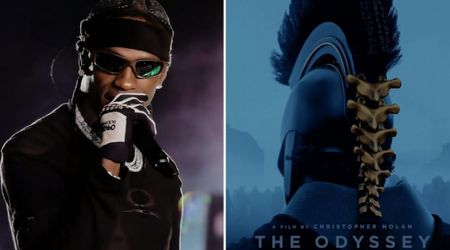'Shakedown': Leilah Weinraub's ode to black gay club culture is welcome addition to 'current climate of conversation'

West-Hollywood is the epicenter of the LGBT community and nightlife in Los Angeles. Signifying decades of queer history, the gay capital proudly sports the colors of the pride flag and boasts of its diversity. Even back in the day, prior to the legalization of LGBT rights, the city became a haven to many - a shelter from the judgmental eyes and expectations of the community and family.
The 1970s and thereafter marked a period in history where the community began to thrive in all its glory. It essentially gave rise to the club culture that is so prominent in the 'wild, wild, West' today. Small spaces like stores and buildings that drew low rents by day turned into intimate dance clubs by night and garnered audiences in masses.
Leilah Weinraub’s documentary feature 'Shakedown' takes it name from one such black lesbian strip night club night where she worked as a “video lady” in the early 2000s. In the bold, captivating documentary, Weinraub puts forth the stories of a group of fierce black women that dominated the underground club scene in the 2000s. Black women, who dance for women. She captures on tape Ronnie-Ron, Shakedown's creator and emcee; Mahogany, the legendary mother of the scene; Egypt, Shakedown’s star dancer; and Jazmine, the Queen of Shakedown.

She partnered with Pornhub, to share her work with a global audience. She had previously collaborated with Pornhub as C.E.O and creative director of her fashion house Hood By Air to create a capsule collection. With the aim to place 'Shakedown' on a platform to reach a wider mass in its unvarnished state, she was encouraged to build a landing page via Pornhub - something which was completely different from the porn site to allow viewers to stream her film.
Weinraub studied media and social change at University in Antioch, Illinois. Her intentions have always been distinct, i.e. raising consciousness about community activism, people and media, using video as a format to publish messages urgently. 'Shakedown', she says, is an independent film and a work of art.
MEA WorldWide reached out to Weinraub to talk to her about her venture and gauge her thoughts about putting her film forward beyond museums and art galleries.
Weinraub worked on collecting footage for most of the 2000s and eventually became a part of the community. So, representation is at the heart of her documentary and essentially that became the driving force behind producing it. She describes the club as being a special place that gave valuable inferences like how to relate to another person, how to treat a woman, how to be a woman, a different idea than just the concept of sex and sexuality. It was important to her to share the story of the 'Shakedown Angels' because they embodied just that.

"It was such an intimate, powerful community that was filled with black women who were that. I had never seen any depiction of black women like this before. And it was important to me to like add to the lexicon of language about how we can be," she says.
Weinraub's film comprises a decade worth of footage, where she interviews the stars of the club, having candid conversations with them about their journey. It also features photographs, flyers, and posters from the 90s. Talking about the creative process she divulged that she had moments where she didn't know how she was going to finish the film and had to seek help to refine her project. The external support came in the form of curators from the Whitney Biennial, who supported her and gave her a clear framework to work with a four-and-a-half-hour-long cut.
"It's like audience, you know, and I think it's placed in a way that I'm happy about. But then I really needed that kind of support. That was like the support of the Whitney. And so after it premiered there, then it premiered at the Berlinale."
Her film subsequently premiered at Tate Modern, MoMA PS1, and Gavin Brown's Enterprise, Harlem, NY and many international festivals.

Weinraub shot the hour-long film mostly by herself, and accepted help from a crew only a handful of times, stressing on immediacy and intimacy as the key reasons. Conversations as those that divulge personal life stories are intimate, while the context and the content is immediate. Her questions mostly revolved around work and labor, focusing on the dancers, what it takes to build a performance persona, their family and personal life.
While Weinraub didn't particularly face any hurdles throughout the movie-making process, she emphasized how important it was to gain and uphold trust. "Trusting me and trusting the story and trusting everyone in the film. That was really hard," she comments.
The documentary also featured testimonials from female customers of the club who spoke about being able to go somewhere that feels more like home to them. They were happy to belong to a place where they were free to be themselves and express themselves openly. At the time of shooting the film, LGBTQ rights had just been legalized in the US.
Talking about the relevance of the subject matter of her film in today's world, she elaborated on why this is the perfect time to revisit early queer club culture. "I think that the world has been much, extremely conservative and racist. And there is like a huge consciousness-raising moment happening in our culture," she stated.
"It's been like that for a little while, but it's just very strong. There's like a strong youth movement that's really a trend transforming opinion at this moment. I'm happy to have been able to publish 'Shakedown' in this current climate of conversation."
A stand-out scene in the film is the journey of a couple into parenthood. The couple opts to have a baby through artificial insemination. There are several inhibitions about a gay couple becoming parents. People have varied thoughts about adult performers having children but Weinraub wants to draw attention to this scene, simply because it is beautiful.
"They is a really big part of the scene. You know, I can't over-explain the film, but sometimes I think I would like to use the language of cinema to explain a few things that don't have like perfect phrases. I think it's really like it's also like teaching people how to treat other people with respect. You know, there's not a thing that very respectable in this community. People treat each other with respect and that's how it should be done."
Take-aways from the film are perceptive, but what Weinraub hopes will hook the audience is the feeling of missing out on something in their lives. It will inspire them to build themselves because that's exactly what everyone in the film did.
For instance, Egypt is a creation of Aisha; Aisha created Egypt and she sees the world through Egypt. From creating a persona and working with it, Weinraub added that it is important for you to build it yourself.
What's next for the filmmaker? Weinraub just moved back to Los Angeles after spending ten years of her life in New York. "I'm excited to continue to make films, you know. And I'm working on developing new features right now," she said.
"I think I found like a really good space for myself right now where I'm making feature narrative work inside of an art space, And that feels like really generative at this point. So I'm excited to keep working."
The film will continue to stream on Pornhub's landing site for the month of March. It is slated to release on Criterion TV on May 1, and will also have a digital release.










